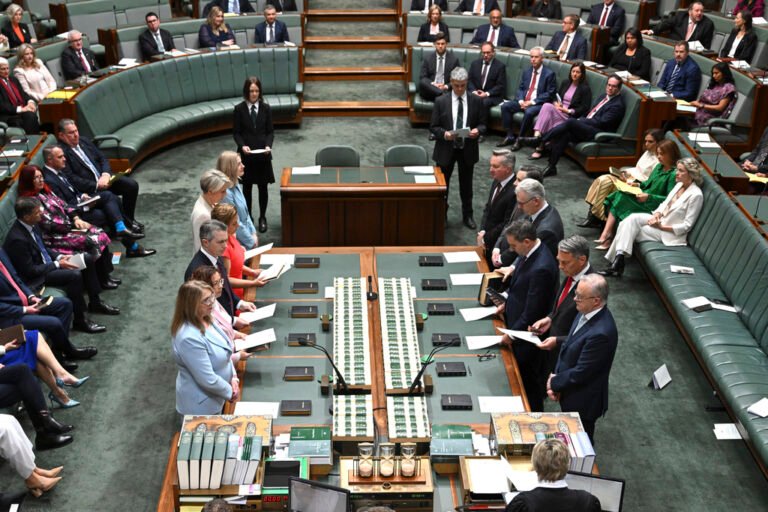Australian Parliament opening events saw rare unity among political rivals during the first day of the new session, but challenges lie ahead as deeper divisions are expected in coming debates.
As the sun rose over Canberra, political leaders came together in an early morning ecumenical service at Wesley Uniting Church. Prime Minister Anthony Albanese and Opposition Leader Sussan Ley sat side by side, both reading from the words of St John: a call to love one another. The peaceful start set a respectful tone as members prepared to return to the business of governing.
Outside the church, Canberra’s traditional custodians led a Welcome to Country and a cleansing ceremony. Politicians from across the spectrum walked silently through smoke from smoldering native leaves, an ancient Indigenous tradition meant to cleanse and protect. The ritual, conducted on the grounds of Parliament House, was a strong symbol of unity and respect for First Nations culture.
Later, the formality continued with a 19-gun salute, a military tradition signaling the official opening of parliament. The thunder of the cannons echoed across the hill, smoke rolling toward the lake as officials, guests, and citizens looked on. The event was steeped in tradition, with the Governor-General arriving in formal dress and a band performing the national anthem.
While the first day was filled with symbolic gestures of harmony, day two is likely to reflect a very different political mood. Parliament will return to sharp debate, as major parties prepare to clash over key policies. Issues such as the cost of living, housing shortages, and climate action are expected to spark fierce discussions in both chambers.
The federal government is set to introduce new bills aimed at addressing housing affordability, including a proposed expansion of rent assistance and incentives for new construction. These plans will likely face strong pushback from the opposition, which has raised concerns about spending and inflation risks.
On the other hand, the opposition is expected to question the government’s climate targets, arguing that current goals are either too ambitious or poorly planned. Meanwhile, crossbench MPs may add their own priorities, such as Indigenous rights, asylum policies, and mental health funding, creating a packed and possibly tense agenda.
Despite these upcoming battles, the opening day offered a reminder of the shared responsibilities carried by those elected to represent the people. Prime Minister Albanese, in his brief address to reporters, emphasized the importance of respectful debate and national unity. He noted that while politicians may disagree, they all serve the same country and people.
Opposition Leader Sussan Ley echoed similar thoughts, calling the morning events “a reminder of what connects us beyond politics.” She said the ceremony highlighted the importance of shared values, even when parties take different paths toward them.
Many MPs, including those from smaller parties and independent seats, appreciated the respectful tone of the day. Several expressed hope that the spirit of the opening ceremonies might carry into actual debates, though few were overly optimistic.
While traditions and rituals played a big role in the day’s events, the reality of governing is set to return swiftly. Parliamentary sessions this year are expected to be intense, especially as the government faces growing pressure to deliver on campaign promises amid economic uncertainty.
As citizens watch from across the country, the contrast between the peaceful first day and the political storms ahead is clear. The calm may be over, but for a few hours, the halls of parliament echoed with unity, shared purpose, and hope.







